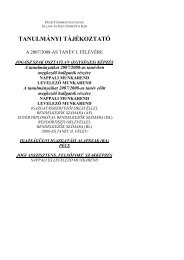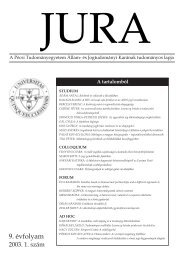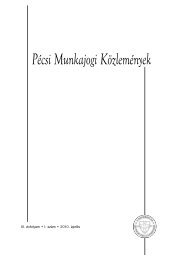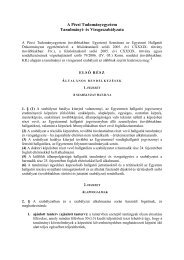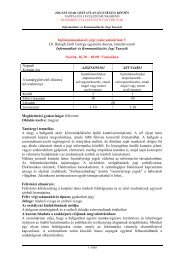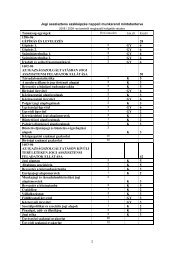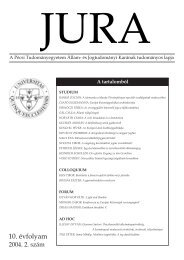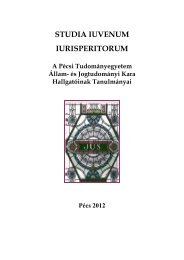2012. évi 2. szám - Jura - Pécsi Tudományegyetem
2012. évi 2. szám - Jura - Pécsi Tudományegyetem
2012. évi 2. szám - Jura - Pécsi Tudományegyetem
- TAGS
- jura
Create successful ePaper yourself
Turn your PDF publications into a flip-book with our unique Google optimized e-Paper software.
224 Ulrich Karpen: Migration and Human Rights – Challenges and Chances5) favorate tendencies (60-80 points),6) favorate (80-100 points). Poland received 42points (halfway favorate), Germany 57 (halfwayfavorate), Sweden 83 (favorate), Portugal79 (favorate tendencies) and the USA 62 (favoratetendencies).All countries, however, after having analyzedthe challenges and dangers of failing integration,strive for improving the possibilities for integration. Thisis a task for society and government, in this order.Employment, schooling, language-education are ofprevailing importance. Competition in sports andcivic groups of all kind are encouraging factors ofcohesion. Psychological openness and curiosity forwhat others can present, show, have in their character,makes friends. Cultural diversity dominatesmore and more local events. As institutions – again –Amnesty International and various internet networksare indispensable. In my home-city Hamburg I am amember of the board of a “Foundation for PoliticallyPersecuted Persons”. We offer journalists, poets, artistsand others – with their families – a stipend to livein Hamburg, to breathe freely, to do what they can’tdo at home. I see possibilities, in particular, in tryingnew instruments for encouraging participation, onthe national level, group level, individual level, forinstance all the internet-tools. Public opinion andpublic opinion makers are an important factor tocombat discrimination and xenophobia.I think, there is agreement in all European countrieson some basic demands to our societies and politicsfor furthering integration. It must be a policy bottomup,not top-down. Integration has to be primarilyan issue of hearts and brains of individuals, not ofinstitutions and governments. However, institutionscan help, support, encourage, finance. On the nationallevel, the language capacity is first ranking. Withoutlanguage and communication, cultural, civic andpolitical participation cannot take place. The strategyshould be: promoting and encouraging by challengingand demanding the individual. All publicinstitutions are called upon to support individualsand families. For that we need not only schools andkindergardens, but in addition a culture of “honoraryoffice”, activities of individuals, associations, groupsfor migrants. Of course, the state must provide forstrict implementation and enforcement of rule of lawinstruments: persecution of honour killings, forcedmarriages, trafficking and prostitution.A national asylum-, aliens- and migration-policy,however, is no longer sufficient. Like with all Europeanpolicy fields, including Schengen, we need aclear policy of public order, transparency, reliabilityof the law and burden-sharing. Here we took the firststeps, but the next ones need to follow.Finally, migration, non-discrimination and integrationare an international policy programme in aglobalized, “migrating society”: We need an internationalsystem of collective maintenance of peace. Thisrequires effective sanctions against countries whichviolate fundamental rights and force their citizensto flee and escape. And then we have to widen theperspective to avoid economic migration, very oftendue to growth of population and unfortunate developmentsof environment.4. Let me conclude with some remarkson Dignity, Freedom and Equality –DemocracyThe core of Human Rights, which we analyzed inview of migrants and integration, are dignity, freedomand equality, namely non-discrimination. Freedomand equality are the source of democracy. I believethat the free democratic order of societies and states willbe the form of government for the future. It will growand spread. Some politicians and scholars advocatethe notion of Human Rights, as described in thisspeech, as being just one of multiple, pluralistic understandingsof Human Rights. That, e.g. the Chineseunderstanding, is a different one. China still has anauthoritarian system of government, which seems toslowly open up to the world. If you talk with Chinesestudents of law and political science, be it in Wuhan,Nanjing or Beijing, you will discover that they havethe same perception of freedom of speech, profession,mobility a.s.o. and also hope to have a chance freely todevelop their capacities. Some politicians and scholarsare of the opinion that the Muslim perception of HumanRights is different from ours. It is true that mostparts of the Muslim-Arab world did not have a chanceto undergo a period of enlightenment, as Europeancountries did in the late 18th and early 19th century.Some imams noticed that and support Islam-researchand teaching at European universities, not at least forthe purpose of educating teachers of Islam at schoolsin a scholarly method and didactic. And as far as theEuropean tradition of understanding Human Rights, wemight be well advised to adhere to the four colums ofEuropean culture which are Greek philosophy, Romanlaw, Judaic-Christian religion and Enlightenment.As Art. 2 of the Lisbon Treaty puts it: “The Union isfounded on the values of respect for human dignity,freedom, democracy, equality, the rule of law and respectfor human rights, including the rights of personsbelonging to minorities. These values are common tothe Member States in a society in which pluralism,non-discrimination, tolerance, justice, solidarity andequality between women and men prevail.”JURA 2012/<strong>2.</strong>



